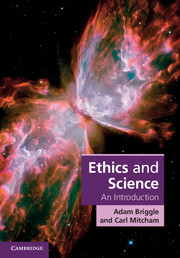Book contents
- Frontmatter
- Contents
- List of figures and tables
- Preface
- 1 Introduction and overview
- 2 Ethical concepts and theories
- 3 Science and its norms
- 4 Research ethics I
- 5 Research ethics II
- 6 Research ethics III
- 7 The science of ethics
- 8 Transition
- 9 Science and politics I
- 10 Science and politics II
- 11 Science and ideational culture
- 12 Science applied
- Epilogue Looking back, leaning forward
- Appendix Ethics codes
- Bibliography
- Index
- References
3 - Science and its norms
Published online by Cambridge University Press: 05 November 2012
- Frontmatter
- Contents
- List of figures and tables
- Preface
- 1 Introduction and overview
- 2 Ethical concepts and theories
- 3 Science and its norms
- 4 Research ethics I
- 5 Research ethics II
- 6 Research ethics III
- 7 The science of ethics
- 8 Transition
- 9 Science and politics I
- 10 Science and politics II
- 11 Science and ideational culture
- 12 Science applied
- Epilogue Looking back, leaning forward
- Appendix Ethics codes
- Bibliography
- Index
- References
Summary
As indicated in Chapter 2, norms are forms of behavior expected by and constitutive of a group; ethics involves an effort at critical reflection on such norms. These norms can be implicit or explicit, the outgrowth of custom and tradition or the outcome of rational decision. This chapter gives a slightly more expansive account of the norms constitutive of science, in preparation for considerations of the complexities of their practical realization. It concerns the norms of science in a general sense – as these have developed historically and become implicitly constitutive of science as a knowledge-producing activity. It argues for a foundational distinction between myth (narrative) and science (nonnarrative rationality) and highlights the institutionalization of modern science that began shortly after Galileo Galilei’s encounter with the church. The final sections survey epistemological and social norms intrinsic to the conduct of science.
Setting the stage: Galileo and the church
In the pantheon of science, Galileo Galilei (1564–1642), Isaac Newton (1643–1727), and Albert Einstein (1879–1955) are often taken to exemplify the ideal. But given his historical priority and conflict with church authority, it is Galileo who is commonly thought to be the most heroic figure – and thus to present in vivid form the general norms of science, even insofar as he was forced to betray them.
- Type
- Chapter
- Information
- Ethics and ScienceAn Introduction, pp. 66 - 86Publisher: Cambridge University PressPrint publication year: 2012

